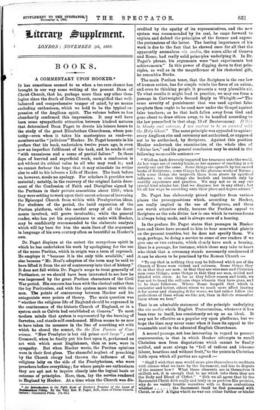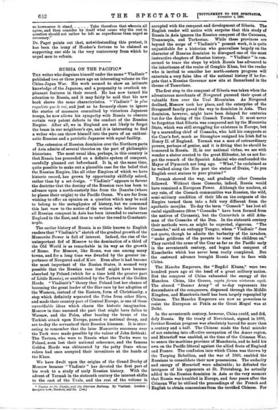BOOKS.
A COMMENTARY UPON HOOKER.*
IT has sometimes seemed to us when a too rare chance has brought in our way some writing of the present Dean of Christ Church, that he, perhaps more than any other thee- logien since the death of Dean Church, exemplified that well- balanced and comprehensive temper of mind, by no means excluding enthusiasm, which we hold to be the typical ex- pression of the Anglican spirit. The volume before us has abundantly confirmed this impression. It may well have been some sympathetic attraction between kindred natures that determined Dean Paget to devote his leisure hours to the study of the great Elizabethan Churchman, whom pos- terity—even when it takes his masterpiece as read—re- members as the " judicious " Hooker. Dr. Paget laments in his preface that his book, undertaken twelve years ago, is even now an imperfect fulfilment of his task, and he sends it out " with uneasiness and a sense of partial failure." In these days of hurried and superficial work, such a confession is not without its ethical value to all who may read it ; and we cannot forbear the hope that it may stimulate its writer also to add to his labours a Life of Hooker. The book before us, however, needs no apology. For scholars it provides new material; notably, in the recovery of the original Latin docu- ment of the Confession of Faith and Discipline signed by the Puritans in their private assemblies about 1533 ; when they were setting to work upon their secret scheme of leavening the Episcopal Church from within with Presbyterian ideas. For students of the period, the lucid exposition of the Puritan platform, with the careful array of all the docu- ments involved, will prove invaluable; while the general reader, who has yet his acquaintance to make with Hooker, may be confidently recommended to the elaborate analysis which will lay bare for him the main lines of the argument in language of his own century often as beautiful as Hooker's own.
Dr. Paget displays at the outset the scrupulous spirit in which he has undertaken his work by apologising for the use of the name Puritan, which in origin was a term of reproaeh. He employs it "because it is the only title available," and also because " Mr. Neal's adoption of the term may be said to have lifted it from the air of controversy into that of history." It does not fall within Dr. Paget's scope to treat generally of Puritanism, or we should have been interested to see how he was impressed by the great Puritan characters of the Civil War period. His concern has been with the clerical rather than the lay Puritanism, and with the system more than with the men. The points of controversy between Hooker and his antagonists were points of theory. The main question was "whether the religious life of England should be expressed in the continuance of the historic Church of England, or in a system such as Calvin had established at Geneva." To most modern minds that system is represented by the burning of Servetus, and stands self-condemned. Milton seems to us now to have taken its measure in the line of scorching wit with which he closed the sonnet, On the New Forcers of Con- science. "New Presbyter is but old priest writ large" ; and Cromwell, when he finally put his foot upon it, performed an act with which most Englishmen, then as now, were in sympathy. But when Hooker wrote, the Puritan opinions were in their first gloss. The shameful neglect of preaching by the Church clergy had thrown the influence of the religions laity on the side of the Presbyterians, who were preachers before everything ; for where people see enthusiasm they are apt not to inquire closely into the logical basis or outcome of principles. Here, then, lay the service rendered to England by Hooker. At a time when the Church was die- * An lestrocludion to the Fifth Book of Hooker's Treatise of the Laws of Ratesiadical Poi‘ty. By the Very Rev. F. Paget, D.D, Dean of Christ Church. Oxford Clarendon Press. Us. 65.1
credited by the apathy of its representatives, and the new
system was recommended by its zeal, he came forward to explain and defend the principles of the former and expose the pretensions of the latter. The lasting importance of his work is due to the fact that he showed once for all that the
apparently anomalous via media, the scorn alike of Geneva and Rome, had really solid principles underlying it. In Dr. Paget's phrase, his arguments were "not experiments but achievements." In this power of digging down to first prin- ciples, as well as in the magnificence of his rhetorical gift, he resembles Burke.
The main Puritan tenet, that the Scripture is the one law of human action, has for simple minds the force of an axiom, and even to thinking people it presents a very plausible air. To what results it might lead in practice, we may see from a passage in Cartwright's Second Reply to Whitgift :—" The same severity of punishment that was used against false prophets then ought to be used now under the Gospel against false teachers; as be that hath fallen away from God and gone about to draw others away, to be handled according to the law prescribed in that chap. 13 of Deuteronomy. If 1113 be bloody and extrenu', I am content to be so cornted the Holy Ghost." The same principle was appealed to against every Anglican rite and ceremony not authorised, or supposed not to be authorised, by Scripture. Against this position Hooker undertook the examination of the whole idea. of "divine law," and his general conclusion may be stated in the following memorable sentence :-
" Wisdom hath diversely imparted her treasures unto the world. As her ways are of sundry kinds, so her manner of teaching is not merely one and the same. Some things she openeth by the sacred books of Scripture ; some things by the glorious works of Nature ; with smite things she inspireth them from above by spiritual influence ; in some things she leadeth and traineth only by worldly experience and practice. We may not so in any one special kind admire her, that we disgrace her in any other ; but let all her ways be according unto their place and degree adored."
Dr. Paget has elaborately pieced together from various places the presuppositions which, according to Hooker, are really implied in the use of Scripture, and these are worth attentive study, because the Puritan appeal to Scripture as the sole divine law is one which in various forms
is always being made, and is always sure of a hearing.
In the preface Dr. Paget states that passages in Hooker here and there have seemed to him to bear somewhat plainly
on the present troubles, but he does not specify them. We may, perhaps, be doing a service to some of our readers if we give one or two extracts, which clearly have such a bearing.
Here is a passage, for instance, which those may take to heart who think that a ceremony stands necessarily condemned if it can be shown to be practised by the Roman Church :-
" To say that in nothing they may be followed which are of the Church of Rome were violent and extreme. Some things they do in that they are men ; in that they are wise men and Christian men some things ; some things in that they are men, misled and blinded with error. As far as they follow reason and truth, we fear not to tread the selfsame steps wherein they have gone, and to be their followers. Where Rome keepeth that which is ancienter and better, others whom we much more affect leaving it for newer and changing it for worse, we had rather follow the perfections of them whom we like not, than in defects remember them whom we love."
That is an admirable statement of the principle underlying the via media which English Protestantism, whenever it has been true to itself, has consistently set up as an ideal. It may not be effective as a popular cry upon platforms, but we hope the time may never come when it loses its appeal to the reasonable soul in the educated English Churchman.
A second passage, not less interesting in regard to present controversies, is that in which Hooker attempts to recall Christian men from disputations which cannot be finally settled, and must always be "full of tedious and irksome labour, heartless and without fruit," to the points in Christian faith upon which all parties are agreed :-
" Shall I wish that men would more give themselves to meditate with silence what we have by the Sacrament, and less to dispute of the manner how ? What these elements are in themselves it skilleth not, it is enough that to me which take them they are the Body and Blood of Christ." " Sith we all agree that by the Sacrament Christ doth really and truly in us perform His promise, why do we vainly trouble ourselves with so fierce contentions whether the Sacrament itself be first possessed with Christ. or no P A tkne which no way can either further or hinder
us howsoever it stand Take therefore that wherein all agree, and then consider by itself what cause why the rest in question should not rather be left as superfluous than urged as necessary."
Dr. Paget points out that, notwithstanding this protest, it has been the irony of Hooker's fortune to be claimed as supporting one side in the very controversy from which he urged men to refrain.























































 Previous page
Previous page